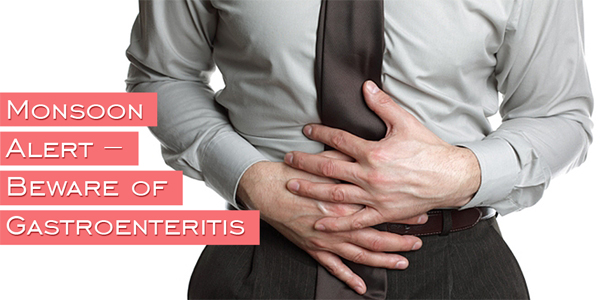Also referred to as Food poisoning, ‘Gastroenteritis‘ is a highly contagious viral infection of the stomach and intestines. It commonly shows symptoms such as diarrhea, vomiting, nausea, body ache, stomach cramps and fever with chills. A mild case of gastro can be treated with over-the-counter medication whereby the symptoms last for approximately 2 to 4 days. During this time, dehydration could be one of the major concerns for the patient owing to massive loss of fluid from the body. It is thus essential to consume plenty of water with and between meals and stick to a bland diet. High fever accompanied by blood in the vomit or stool, could be an indication that the patient’s symptoms have worsened and he/she may have to be admitted to a medical facility for advanced treatment with IV fluids.
As per the recent figures provided by the BMC’s health department, 1,023 cases of gastroenteritis were reported last month in civic hospitals. In the past few days, the BMC hospitals have received more than 66 gastroenteritis cases.
Mumbai is already under a spell of gastro diseases, it’s about time; you get acquainted with the lesser known facts
Mumbai is already under a spell of gastro diseases, it’s about time; you get acquainted with the lesser known facts
- Gastroenteritis is typically caused by bacteria such as Salmonella, E. coli, Campylobacter or a virus like Norovirus. This virus is commonly transmitted by drinking contaminated water, consumption of raw/undercooked food and improper hand washing, especially by food handlers.
- Not only adults but kids too can contract this disease. The smaller/younger the child, the earlier medical assessment should be sought
- Gastroenteritis is easily transmittable. The virus that causes this disease thrives in our faeces and vomit. One of the symptoms associated with gastro is vomiting and often particles become airborne during or after people puke, thereby infecting others around. Even a sneeze could be responsible for spreading this virus. Patients can spread this virus up to 48 hours after their symptoms have stopped. If you are nursing someone who is suffering from Gastroenteritis, make sure you take necessary precautions to protect yourself.
- A thorough physical exam is the basis of diagnosis for gastroenteritis. A stool sample could give a better understanding of this disease and help in detecting the exact type of virus (parasitic or bacterial infection) that has caused the illness
- Bacterial gastroenteritis is spread as a result of poor hygiene (mainly if people do not wash their hands properly after using the washroom, or after cleaning vomit or dirty nappies). Rotten food and pets could also be the carriers of this virus. The symptoms of food poisoning usually starts to show almost 6 to 12 hours after consuming rotten or contaminated food & beverages.
- Recovery time depends on the severity of this medical condition. As soon as your appetite returns, do not switch to normal food. Continue with the consumption of bland food items at least for a day, as your intestines will remain sensitive until you’ve made a full recovery.
When down with gastroenteritis:
Have more of citrus fruits, soup, boiled/steamed veggies, bland food items, Apple/Pears/Sweet lime juice, beans, and bananas
Avoid dairy products, Salty, Sugary, Spicy & Oily foods, caffeine, alcohol, and nicotine


